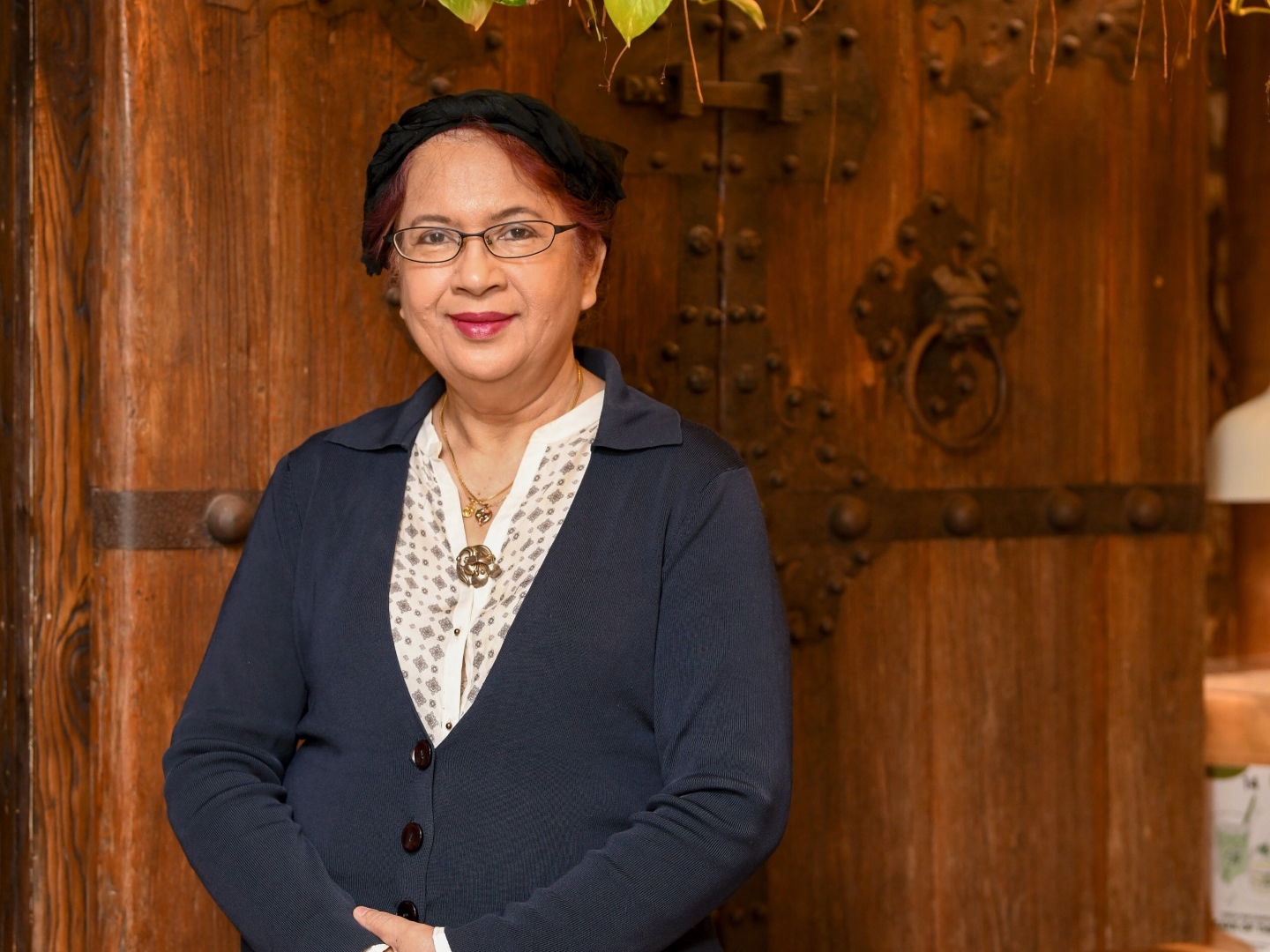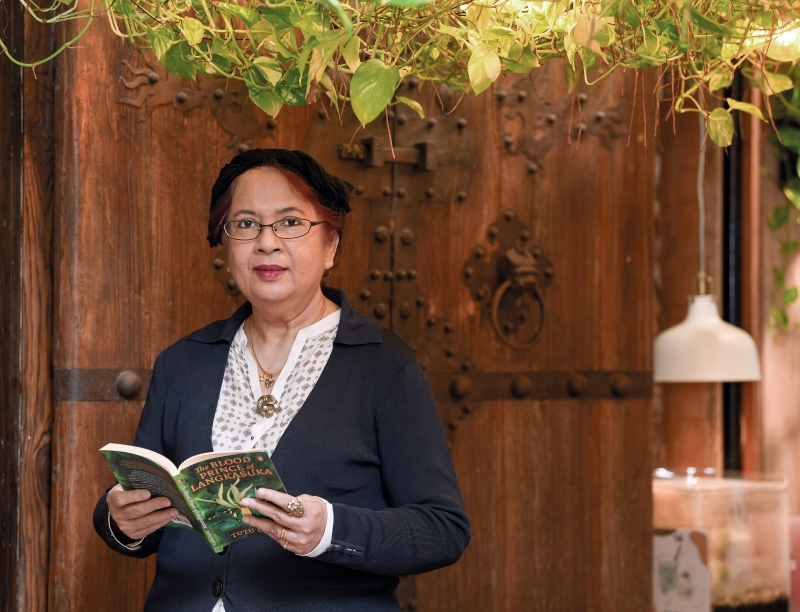
Hailing from Churachandpur, India, Tutu's family moved to Malaysia in 1963 when her father was recruited by the Malaysian Army to work as a doctor (Photo: Low Yen Yeing/ The Edge Malaysia)
The mind-bending scene of a sunbird getting caught by a Siamese house cat called Lapsang Souchong opensThe Fraught Lives of Nathan Kwan and Lapsang Souchong. The main character, Nathan, is shocked at the sight of this but he quickly understands that his beloved pet is just trying to offer him a gift when it drops the ruby-cheeked bird, known by its scientific name of Chalcoparia singalensis, at his feet.
Nathan is determined to rescue the tiny helpless creature, quite a rare species that is protected by law, making it illegal to capture or kill it. Anxious and worried, he reaches out to his cousin and best friend Junie, a top student in biology class, for help. As expected, the bird cannot be saved and they dig a hole in the ground to bury it. But at the last minute, Nathan changes his mind and insists on keeping it. “I can preserve it, just like the Egyptians!” he professes.
This introduction is inspired by a true event, recounted to author Tutu Dutta by her friend Tuen Mong in Cuba in 2010. The former greatly admired the latter’s affection and dedication to her pets. “This took place in Havana, where my husband was posted. One morning, their cat brought them a very colourful bird — it was actually a hummingbird. They didn’t know what to do, but they understood that it was a present. I didn’t know when a cat wants to show you that they appreciate you, they will gift an animal they hunted. Sometimes, if you are unlucky, you get a rat or something like that.
“Their cat disappeared not long after, unfortunately. They felt so sad because they didn’t have anything to remember it by, so they froze the bird. They tried to have it stuffed or preserved by a taxidermist but it was too damaged. Then they had it mummified and took it with them to the UK. Sadly, it was seized by customs. I thought that would make an interesting opening,” says Tutu.
The story develops to reveal more characters, who together have to manoeuvre a challenging journey as students at the prestigious Noble Hall International School in Subang Jaya, Selangor. Nathan and his friends, Junie, Sachin Sundara and Aida Anargul — the last recently transferred from Kazakhstan — are called bookish nerds who know too much about science and history by their antagonistic peers. Aida, in particular, attracts unwanted attention for also possessing an artistic talent, singing.
In the book, the author delves into the issue of bullying among students in a highly competitive environment. While the quartet are quite occupied with their mummification project to conserve Nathan’s sunbird — by relying on apparatuses and substances available in the school laboratory — they are also forced to deal with jealous classmates who are threatened by Aida’s beauty, intelligence and talent.
books_800px.jpg

“I believe all of us have experienced being bullied at some point in our lives, especially in school. For me, it happened when I was 11 and, oddly enough, for being favoured by a teacher. Everyone else was punished — they had to write lines — while I was excused. It made me realise that being favoured may not be such a good thing after all.
“Bullying in those days involved being called names — in my case, ‘teacher’s pet’ — and having some nasty stuff scrawled on the wall, which I just ignored. But nowadays, bullying can take the form of actual physical violence — being kicked and punched. A few children who are victims have taken their own lives, which is horrifying.”
The foursome’s complicated lives at school become more difficult when Lapsang Souchong goes missing one night. Their search and rescue mission in Kota Kemuning in Klang, Selangor — where the author is based — leads them to discovering a business that is conducting irresponsible and unethical cross-breeding of animals. The issue of animal exploitation is also something Tutu had encountered in the past. She recalls chancing upon a pet shop where wildly beautiful exotic cats were excessively bred and sold for profit. “It left an impression even after 10 years.”
Lapsang Souchong is a rather unique name for a pet. How did that come about? “When I was younger, I was very interested in tea. I would buy many varieties and try them. When we went to London a while back, we visited this famous place called Fortnum & Mason and they had this particular kind. I did some research and found out it was perhaps the first tea that was brought to the UK from China.
“The children are very curious about things, so they like to pick up information about anything and everything. That’s the reason they decided to name the cat after quite an exotic tea as well.”
Many scenes and details in this young adult fiction are drawn from Tutu’s personal experiences. Hailing from Churachandpur, India, she was born to a Bengali father and Zou mother. The family moved to Malaysia in 1963 when her father was recruited by the Malaysian Army to work as a doctor. “I’ve actually lived in this country much longer than in India.”
The locations chosen for the book are those the author is well acquainted with, such as an international school as well as Kota Kemuning and Subang Jaya. “I know a bit more about international schools. If I’m trying to write a story within a national school environment, I would have no idea what the students are like. So, if I had chosen that setting, it wouldn’t have felt authentic.
“It’s quite possible the book contains materials from certain incidents in my life, possibly my daughter’s life, and also what I read about. But they have been reframed or fictionalised for the story.”
20240709_peo_tutu_dutta_6_lyy_1.jpg

Many of the scientific elements in the novel are also familiar to Tutu, who studied the subject in Universiti Putra Malaysia and pursued a master’s degree in philosophy at Universiti Malaya. But as a child, she had a deep interest in myths, legends, folktales and fairy tales. “I was completely drawn in by the bright and beautiful illustrations and magical narratives, mostly Western because quality books on Eastern and Malaysian tales were almost non-existent, at least during my time. Folktales teach you about story structures and constructing plots.
“I also loved science and became a STEM student. I liked it a lot because it trains you to think logically. But when I got to do my master’s, I found it a bit too lonely, working in the lab for long hours. I didn’t like that. So I went into communications by taking courses in public relations and marketing. I started by writing press releases.”
At the time, Tutu was already married to a diplomat. She had to stop working to follow her husband to Singapore, Lagos, New York, Havana and Zagreb, among others. “New York was quite remarkable in my writing journey because it’s the publishing capital of the world. I sort of saw a big possibility that someone like me could write. Their [publication scene] is very familiar with Western fairytales, but there are not many from an Asian point of view.
“Also, most Asian books are written by Asians born in the US. They say it’s very diverse and inclusive, but these are people who were born and grew up there. Whereas those who actually live in Asia seldom get published. So, it pushed me to try to do something about that.”
Her first book, Timeless Tales of Malaysia (2009), is a collection of legends and folk stories adapted for children. The tales are drawn from all parts of Peninsular Malaysia as well as Sabah and Sarawak. “When you like those subjects, you tend to write for children. And the way I write, I think it’s more suited for that age group.” Her subsequent publications were The Jugra Chronicles (2013), Phoenix Song (2015), Nights of the Dark Moon (2017) and The Blood Prince of Langkasuka (2021).
In 2019, Tutu co-edited an anthology with Sharifah Aishah Osman called The Principal Girl. The book highlights female empowerment, privilege, agency, strength and the wisdom of young girls and women. Tutu believes education should start early. “I think that’s why I write children’s books, so they can learn at an early age and get a more rounded view of the world. The knowledge will help them to know they are important, they have a voice and their opinion counts.”
'The Fraught Lives of Nathan Kwan and Lapsang Souchong' is available at Kinokuniya for RM69.95. An official launch event will be held at Eslite Spectrum Kuala Lumpur on Aug 17.
This article first appeared on July 29, 2024 in The Edge Malaysia.


